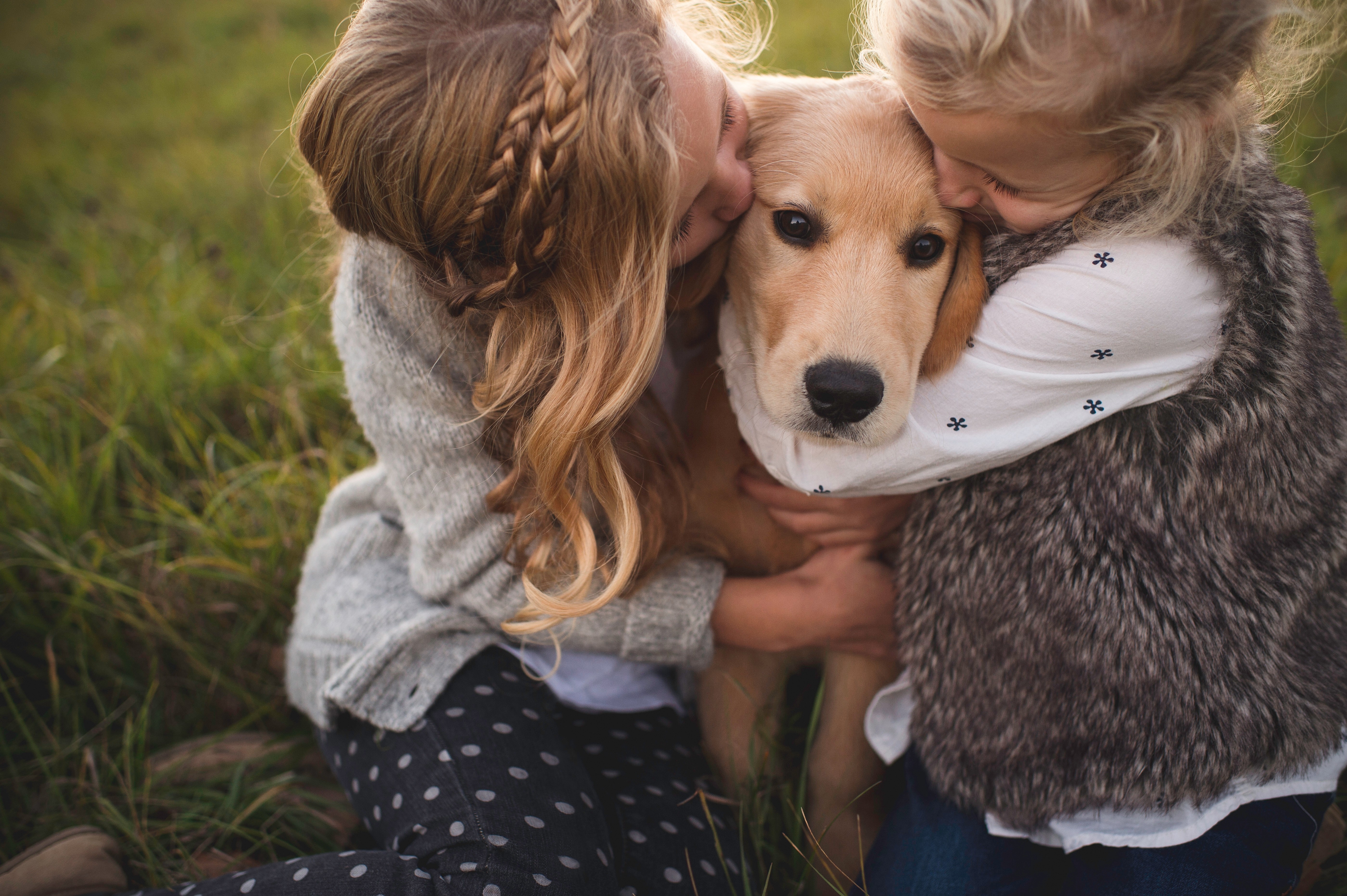What raising dogs taught me about parenting
There is parenting wisdom to be gleaned from experience with pooches


A free daily email with the biggest news stories of the day – and the best features from TheWeek.com
You are now subscribed
Your newsletter sign-up was successful
According to my mother, I brought my first stray dog in off the streets of San Juan, Puerto Rico, when I was 3 years old. Since then, I've pretty much always had at least one canine — usually more. In order to maintain peace and order in this ever-evolving pack, I've read and researched reams of material about dogs, their behavior, and training. I can't say I'm an expert, but over the years I've learned a few things.
When the time came for my husband and me to have children (or, as I explained to our dogs at the time, "a human puppy") of our own, I realized something: There is parenting wisdom to be gleaned from experience with pooches. While I've never put any of my offspring in a crate (tempted as I was on occasion), there are parallels worth considering.
Listen to the experts
The Week
Escape your echo chamber. Get the facts behind the news, plus analysis from multiple perspectives.

Sign up for The Week's Free Newsletters
From our morning news briefing to a weekly Good News Newsletter, get the best of The Week delivered directly to your inbox.
From our morning news briefing to a weekly Good News Newsletter, get the best of The Week delivered directly to your inbox.
In my quest to be the best dog-person I can be, I've read and re-read every publication put out by the monks of New Skete. I'm addicted to Cesar 911. I also follow various dog-expert blogs… but most of all, I learn from the good people around me who have more experience and knowledge than I do. My vet is on speed-dial. I volunteer at the Humane Society and learn something new almost every time I go. Whenever I visit the dog park, I chat with the other folks there, picking up tips about everything from nipping to nutrition. No one person has all the answers, but good information is yours for the taking if you're willing to listen and learn discerningly.
So when I found out I was expecting for the first time, I followed suit and immediately turned to the warm wit and wisdom of the What to Expect parenting gurus, Heidi Murkoff the late Eileen Eisenberg. I subscribed to parenting magazines. I watched Supernanny and fervently hoped I'd never need her. Once the internet blew into being (and I had a few more children to manage), I began to follow some carefully chosen websites and blogs. Above all, I began to actually heed my mom and dad, my aunties and uncles, and all my friends who had walked this path before me. Their advice still is essential to how I understand my children and my role as their parent.
Pay attention
Speaking of understanding, it's impossible to be an insightful, responsible guide to anyone — canine or human — without offering an abundance of your full and undivided attention.
A free daily email with the biggest news stories of the day – and the best features from TheWeek.com
I learned early on in my experience with doggies that the ones who got in trouble were the ones whose people were overly distracted or not truly engaged in the process of raising their pets. Go to any dog park, and look for the folks glued to their smartphones or flirting in the parking lot while Fluffy runs rampant in the off-leash area. You can be pretty sure those are the people whose dogs are going to knock over the trash cans, insist on mounting the other dogs, and/or get in fights.
The same goes for children. When mine were small, I'd occasionally be overwhelmed with work and bills and all the other accessories of adulthood. During these periods of stress, it was easy to switch to maternal autopilot, assuming so long as the food I tossed down in front of them was healthy and the videos I plugged them into were "educational," all would be well.
It never was. Every time I dialed-in motherhood for an extended period of time — every time — one or more of my offspring would respond negatively, either by acting out, regressing, or withdrawing.
I'm not saying anyone should become a slave to kids — or dogs. All parents (and pet owners) need time away from their charges to take care of business and take care of themselves, physically and mentally. Just make sure that when you are with them, you are with them. Because only by truly observing will you be aware of the subtle shifts in behavior, body language, and energy levels that are all critical clues to how your dependents are thinking and feeling at any given time, and the myriad differences that make each one unique.
One size does not fit all
No single dog I have ever cared for has been motivated by the same things or responsive to exactly the same training techniques that have worked for another. Keva the Collie was vastly intelligent and eager to please; she was easy to teach using standard praise and reward methods. Although she occasionally misbehaved, Keva was so devastated by the very possibility of human displeasure that she practically collapsed with regret on the rare occasion we came home to find her napping on the couch or nibbling on a stolen treat. No further interventions needed.
My adorable and affectionate Pitbull/Shar-Pei mix Koda, on the other hand, is about as smart as a rock. Although fond of me, he could not care less about making me happy. What does make Koda happy is upending the laundry hamper and strewing the family's clothes all over the house, so he'll do that every time I forget to close the laundry room door. I could yell at him, but what good would that do? Food is what motivates this little gremlin of a dog, so I use small treats and pats to reinforce his good behaviors again … and again … and again … and figure it's up to me to proactively curb his negative behaviors. This will probably go on for the rest of our shared time together.
Then there are my children, whose wildly varied personalities and predilections defy the reality of their shared genes. One infant was miserable unless glued to the side of one or the other of his parents. We nicknamed him "Velcro Baby," and he slept with us for three years. (He's a fully independent and happy adult now, in case you were wondering.) The next one came along and — guess what? — he needed his space. It took us months to figure out this baby wouldn't stop crying until we left him in his crib to settle down. (This one is a sophomore in college, and he still craves a great deal of solitude.)
One child needs firm boundaries and even firmer consequences to remind her to toe the disciplinary line; the other is so sensitive and self-conscious, parents must be careful to frame instructions and criticisms in language he can accept without falling apart. A son in graduate school might call or text for a parental consultation every other day, while his tweenie sister — still at home — needs plenty of time to think through things on her own before talking them over with the 'rents. Respect them both.
They're all different. If we want to be effective parents, we have to approach them all a little differently.
Be calm. Be patient. Be the boss.
This is not to say there should not be consistencies in your methods. While raising both dogs and young people, it is always important to set clear expectations. How can they know what they must to do to be happy, safe, and successful in this shared world unless you take the time to communicate these ideas to them in whatever way each best understands?
Establish yourself early on as their guide — not their friend (though you love them), nor their equal (though you respect them). With dogs, establish yourself as the leader of your pack. By the same token, let your children know from their earliest days that you are The Adult, capable, reliable, and in charge. They need the security of this knowledge — even if you have to fake it.
And sometimes, as a parent, you will have to fake it. Canines and humans alike are responsive to emotions and their corresponding behaviors. If you are frightened, nervous, angry, or unsure of yourself, your body language, the tone of your voice, even your smell will send distinct messages to those in your charge that they should be feeling the same way. And you don't want that. Teach yourself to breathe deeply. Moderate your voice and adopt a tranquil expression, even in the most stressful of situations. By keeping your demeanor calm, you'll be able to keep them calm — and in control — as well.
Of course everyone loses it sometimes. If this happens — with your pup or your little person — get yourselves out of the stressful situation as quickly as possible. Enlist the help of someone else to take over while you regain your composure. You will no doubt be similarly enlisted one day. Dog owners — and parents — know it takes the village, so take advantage of others' help when you need it.
Whatever you do, don't hit, spank, or slap either a dog or a child. The research has been done and conclusions are clear: Physical punishment isn't just useless, it's harmful and cruel. If you think it is ever Okay to strike a dog or a child, just don't have one. Find another hobby.
Love
Look: Dogs — and children — are privileged choices, not necessities. Both pooches and kids require a great deal of time, energy, and money to raise properly, so it's not a great idea to acquire one, the other, or both unless you absolutely, unequivocally love them. Don't fall for the latest pet-as-accessory trend or the idea that your American Dream isn't complete without a Golden Retriever and 3 beautiful children under your roof. Just because your parents want grandchildren or you feel something vague is "missing" from your existence is no reason to undertake such profound responsibility.
On the other hand, as difficult as raising both dogs and kids can be, these experiences can also be rewarding beyond description. So, if, through the rivers of excrement (not all of it deposited where it should be), the barking and the crying, the defiant behaviors and periodic tantrums, you feel the magic, the bond of trust, protectiveness, and affection that marks the relationships both between human and canine and parent and child, you will know one of life's greatest rewards.
That's love. You've earned it. Revel in it.
Leslie Turnbull is a Harvard-educated anthropologist with over 20 years' experience as a development officer and consultant. She cares for three children, two dogs, and one husband. When not sticking her nose into other peoples' business, she enjoys surfing, cooking, and writing (often bad) poetry.
-
 Health insurance: Premiums soar as ACA subsidies end
Health insurance: Premiums soar as ACA subsidies endFeature 1.4 million people have dropped coverage
-
 Anthropic: AI triggers the ‘SaaSpocalypse’
Anthropic: AI triggers the ‘SaaSpocalypse’Feature A grim reaper for software services?
-
 NIH director Bhattacharya tapped as acting CDC head
NIH director Bhattacharya tapped as acting CDC headSpeed Read Jay Bhattacharya, a critic of the CDC’s Covid-19 response, will now lead the Centers for Disease Control and Prevention
